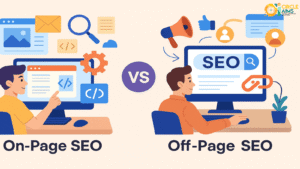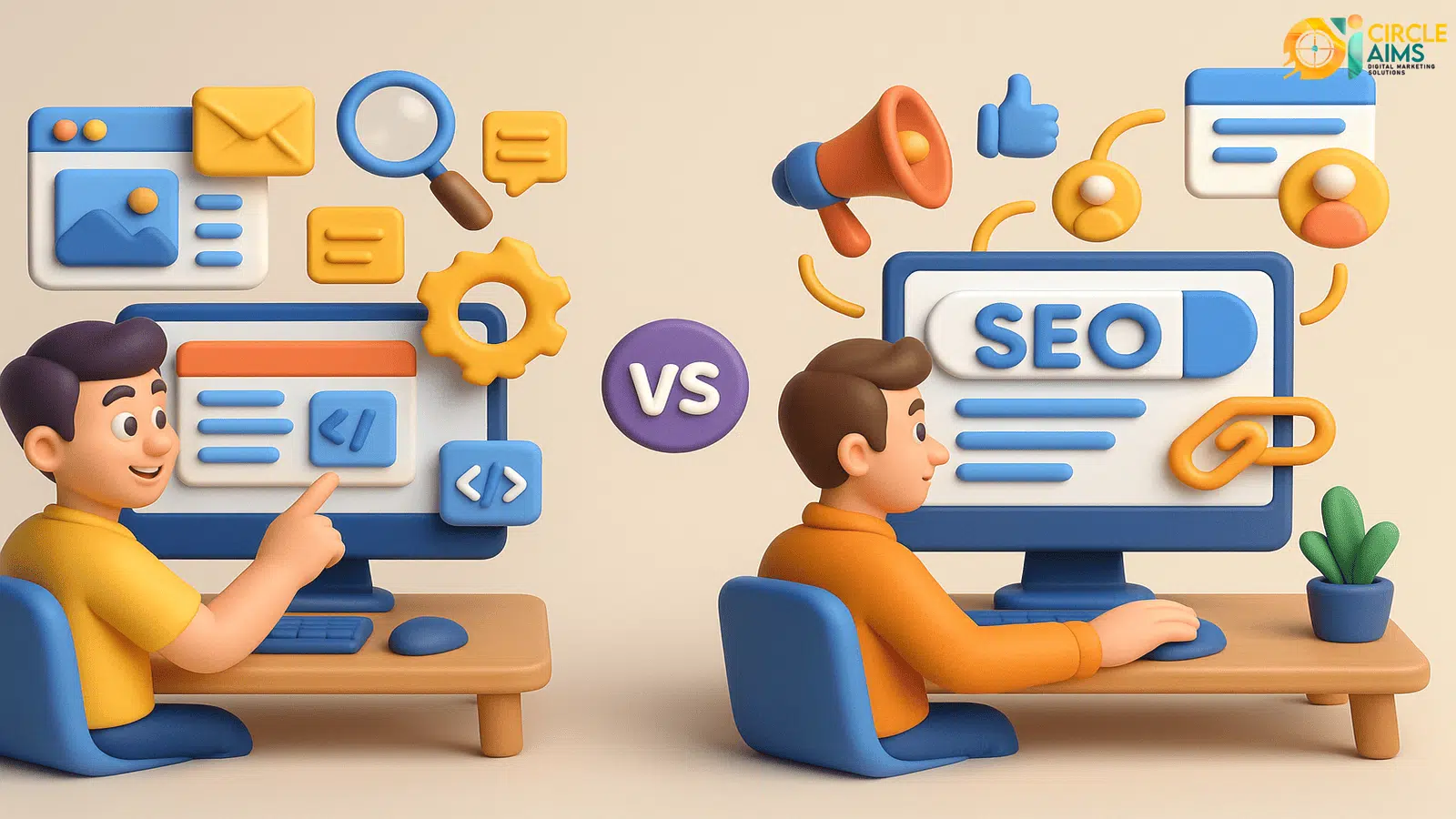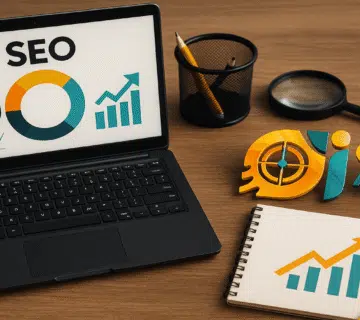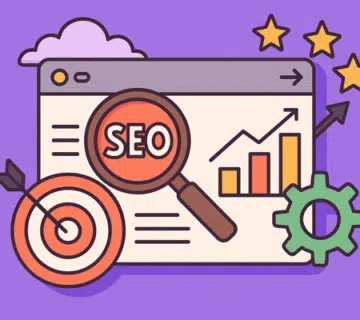The Difference Between On‑Page SEO and Off‑Page SEO
Contents
- What Is On‑Page SEO?
- What Is Off‑Page SEO?
- The Importance of On‑Page SEO
- The Importance of Off‑Page SEO
- On‑Page SEO Techniques
- Off‑Page SEO Techniques
- Comparison: On‑Page vs. Off‑Page
- Challenges in On‑Page SEO
- Challenges in Off‑Page SEO
What Is On‑Page SEO?
On‑page SEO (also known as internal SEO) refers to the practices and techniques applied directly on the website itself with the aim of improving its visibility in search engine results. On‑page SEO includes many essential elements that help improve content quality and increase its accessibility. One of the most prominent of these elements is page content optimization: the text must be clear, useful, and directly relevant to the search topic. Keywords should be inserted naturally without overuse, to ensure reader satisfaction and improve site ranking.
Another important aspect of on‑page SEO is the site’s overall structure and organization. This can be achieved by creating a logical page hierarchy and embedding internal links that help both search engines and users navigate the site’s content. Internal links enhance user experience and increase the time visitors spend on the site, which positively affects the site’s ranking in search results.
Additionally, technical elements play a vital role in on‑page SEO. This includes optimizing title tags, headers, meta tags, and descriptive data. It is also essential to recognize and improve page loading speed, since pages that load faster have a greater chance of attracting visitors and meeting search engine standards.
In general, on‑page SEO is a fundamental pillar of a search optimization strategy. It can be improved by focusing on consistent quality in content and the site’s technical structure, contributing to better content visibility and higher chances of reaching the target audience.

What Is Off‑Page SEO?
Off‑page SEO (also called external SEO) is another core component of strategies for optimizing a website’s presence online. This type of SEO focuses on factors that affect a site’s ranking in search results but are external to the site itself. These factors primarily include inbound links, social media engagement, and building the site’s reputation.
Inbound links (backlinks) are among the most influential factors in off‑page SEO. They refer to links from other sites pointing to your site. These links act like votes from external sites on the quality of your content, thereby having a significant impact on your ranking in search results. It is important that these backlinks come from reputable and trustworthy sites, because links from low-quality or spammy sites can harm your ranking.
Social media also plays a crucial role in off‑page SEO. SEO strategies interact with engagement metrics on platforms like Facebook, Twitter, and Instagram. Shares and comments boost content awareness. The more your content is shared, the more opportunities arise to earn additional backlinks, which helps strengthen your overall SEO strategy.
Building an online reputation for the site requires ongoing effort. This can be achieved by producing high-quality content, engaging with your audience, and using appropriate outreach channels to enhance visibility and trustworthiness. In sum, off‑page SEO is a vital factor in attracting traffic and improving a site’s ranking in search engines, contributing to achieving the site’s marketing goals.
Importance of On‑Page SEO
On‑page SEO is one of the cornerstones of success in the world of search engine optimization, as it plays a critical role in how search engines perceive your site’s content. It provides a framework for adjusting and improving internal site elements, which helps raise the overall user experience. By applying effective on‑page SEO strategies, marketers can enhance visitor experience, reduce bounce rate, and increase dwell time.
One of the key areas of on‑page SEO is the site’s architecture and design. The internal structure of the site should be logical and user‑friendly, helping visitors easily navigate between different pages. This not only improves user experience but may also enhance the site’s chances of ranking higher in search engine results, thereby increasing visibility and traffic. For example, using appropriate keywords in titles, descriptions, and meta tags can significantly influence how search engines perceive content importance.
Moreover, optimizing page loading speed has a notable impact on conversion rates. Faster, easy-to-use websites increase the likelihood that visitors stay longer, which contributes to a lower bounce rate — an important metric that search engines monitor to assess page quality. If a visitor feels the browsing experience is satisfying, they are more likely to revisit and even recommend the site to others, boosting the site’s reputation and future visits.
Importance of Off‑Page SEO
Off‑page SEO is a crucial element that helps build a website’s digital presence. The concept of off‑page SEO encompasses all activities that occur outside the site itself aimed at improving its ranking in search engine results. This primarily happens through acquiring external links from credible websites, which plays a pivotal role in enhancing search engines’ trust in your site and thereby improving its rank in result pages.
External links are one of the most important off‑page SEO factors. When other websites refer users to your site via links, that acts as a vote or endorsement of your content quality. This endorsement raises trust with search engines, since such links are among the main factors in ranking improvement. Additionally, backlinks can drive traffic from interested external sources, facilitating access to a wider audience.
Social engagement is also integral to a successful off‑page SEO strategy. Engagement on social platforms helps build a community around your content, increasing awareness of your site and boosting visitor numbers. Frequent sharing of your content improves the chances of acquiring more external links, and this feedback loop can strengthen your competitive position. Therefore, managing social interaction is a vital component of any off‑page SEO strategy.
Based on the above, off‑page SEO works to enhance the site’s credibility in the eyes of search engines, and is a key factor in boosting its digital visibility through external links and effective social engagement.
On‑Page SEO Techniques
On‑page SEO incorporates a variety of technological and strategic methods aimed at improving the site’s ranking in search results. One of the most important techniques is keyword optimization: selecting keywords that precisely reflect the site’s content. This requires thorough research of terms that users frequently search for. Once appropriate keywords are identified, they should be integrated naturally in the text without overuse to avoid negative impact on user experience.
In addition to keyword optimization, the use of meta tags is important. These tags help search engines better understand page content. They should contain concise information that reflects the page’s content, ideally including key keywords, which boosts effectiveness in search. Moreover, these tags should be compelling to encourage clicks when displayed in search results, thereby increasing click-through rates.
Content formatting is also a core part of on‑page SEO. Text should be organized into short paragraphs, and subheadings used to add clarity and readability. Lists and bullet points improve ease of reading. Images and videos are effective in enhancing engagement, but they must be used appropriately with alt (alternative) tags. By following these techniques, digital marketers can strengthen on‑page SEO’s effectiveness and see real positive results.
Off‑Page SEO Techniques
Off‑page SEO techniques are crucial in a SEO strategy, encompassing all actions performed outside the site to increase its visibility in search engines. One of the most prominent techniques is link building, which is the cornerstone of off‑page SEO. Link building involves obtaining links from reputable and credible websites, which strengthens search engines’ trust in your content. This can be done via guest blogging, where authors publish articles on external blogs that include links back to their own site.
Moreover, social media promotion represents another effective approach to boosting site visibility. By sharing content on platforms like Facebook, Twitter, and Instagram, brands can reach a broad audience and stimulate engagement. That interaction increases awareness of the content, which raises the likelihood users share your site’s links, and thus improves search engine rankings.
As for digital marketplaces and influencer marketing, they also offer important opportunities for off‑page SEO. Influencer marketing involves collaborating with bloggers or influencers in relevant fields. Such partnerships help increase exposure and reach new audiences, thereby contributing to improving the site’s off‑page SEO. It’s worth noting that diversity in off‑page SEO methods is vital to achieving effective results and remaining competitive in the digital arena. To get the best results, brands should adopt a comprehensive strategy that integrates these techniques in synergy.
Comparison: On‑Page vs. Off‑Page SEO
On‑page and off‑page SEO are both foundational strategies in search engine optimization, each with its distinct advantages and disadvantages. On‑page SEO focuses on optimizing internal elements of the website, such as content, page titles, meta descriptions, and site structure. By improving these elements, you can boost user experience and content accessibility, which helps improve the site’s ranking in search results.
In contrast, off‑page SEO emphasizes enhancing the site’s reputation through external link acquisition. This includes obtaining links from other sites, seen as positive endorsements. Off‑page SEO helps strengthen the site’s credibility and appearance in search results, particularly when links come from reputable, high-authority sources.
One advantage of on‑page SEO is full control—you can make all adjustments you deem suitable. However, relying solely on on‑page SEO may yield limited results if not complemented with off‑page efforts.
Off‑page SEO, meanwhile, involves link building which is harder to control and may lead to unpredictable outcomes. But when used in tandem, on‑page and off‑page SEO can markedly improve a site’s search visibility, enabling you to reach a wider audience and increase traffic.
Therefore, achieving balance between on‑page and off‑page SEO is essential for optimal results in the digital space. It is important to consider and integrate strategies from both approaches to ensure SEO effectiveness.
Challenges in On‑Page SEO
Implementing on‑page SEO strategies faces numerous challenges that may affect their effectiveness. One prominent challenge stems from the continual changes in search engine algorithms. These changes can alter how search engines evaluate content, requiring digital marketers to adapt quickly and effectively. For example, Google algorithm updates may impact page rankings, necessitating continuous performance monitoring and precise analysis.
Moreover, content organization is a major challenge in on‑page SEO. Writers and editors must ensure that content is clear and well-structured, with appropriate headings and separated paragraphs. That part also depends on optimizing user experience, as page speed and ease of navigation influence how search engines judge your site. The requirement that sites be responsive across devices adds further design and layout complexity.
There are also challenges related to data analysis and content performance. Although many tools exist to measure performance, analyzing this data and extracting core insights requires certain skills and experience. Furthermore, successful strategies demand balancing keyword use strategically without overuse, avoiding “keyword stuffing” that might harm user experience.
Challenges in Off‑Page SEO
Off‑page SEO is a critical aspect of search optimization, but it brings its own set of challenges for marketers. The first challenge is intense competition. In the online era, many websites strive to rank highly in search results. Therefore, marketers must invest substantial effort and time to achieve positive results. Competition extends not only to keywords but also to content quality and link distribution strategies.
The second challenge is acquiring high-quality links. Links from reputable, high-authority sites serve as trust votes, improving your site’s ranking. However, finding such sites or gaining their agreement to link to your content can be difficult. It often requires relationship building with owners of other sites, which may be time-consuming and laborious.
Additionally, marketers face challenges tracking off‑page SEO performance. With continuous updates in search engine algorithms, your site’s ranking may drop unexpectedly. It’s important for marketers to monitor the performance of acquired links and metrics like organic traffic from external sites. This demands consistent adaptation and analysis to maintain high ranking in search results.
In short, off‑page SEO presents many challenges—from high competition to difficulty obtaining quality links. Marketers must be prepared to deal with these hurdles regularly to ensure effective optimization of their websites.




No comment